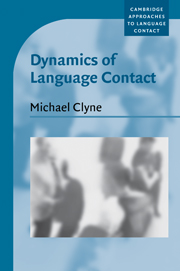Book contents
- Frontmatter
- Contents
- List of map and figures
- List of tables
- Series editor's foreword
- Acknowledgments
- List of abbreviations
- 1 Introduction
- 2 Dynamics of language shift
- 3 On models and terms
- 4 Dynamics of convergence and transference
- 5 Dynamics of transversion
- 6 Dynamics of plurilingual processing
- 7 Dynamics of cultural values in contact discourse
- 8 Towards a synthesis
- Notes
- References
- Index of authors
- Index of languages
- Index of subjects
1 - Introduction
Published online by Cambridge University Press: 18 December 2009
- Frontmatter
- Contents
- List of map and figures
- List of tables
- Series editor's foreword
- Acknowledgments
- List of abbreviations
- 1 Introduction
- 2 Dynamics of language shift
- 3 On models and terms
- 4 Dynamics of convergence and transference
- 5 Dynamics of transversion
- 6 Dynamics of plurilingual processing
- 7 Dynamics of cultural values in contact discourse
- 8 Towards a synthesis
- Notes
- References
- Index of authors
- Index of languages
- Index of subjects
Summary
Interrelationships
The past decade or so has seen an unpreceented growth in the study of language contact from a number of theoretical perspectives. Much of this has been the result of the European Science Foundation's Network on Code-Switching in the late 1980s and early 1990s, coordinated by Georges Lüdi. Some of the fruits of this work can be seen in Milroy and Muysken (1995) which brings together in one edited volume many approaches to language contact research. The arena of language contact research is now much wider, including what were previously emigrant rather than immigrant nations in Europe (e.g. Sweden, Germany, Italy) as well as former colonies in Africa, resulting in less usually studied pairs or groups of languages in contact. The linguistic effects of globalization and increased migration have also boosted the research activity in languages in contact. Preoccupation with universals and theoretical models has mainstreamed the field within so-called ‘core linguistics’ as well as in sociolinguistics and psycholinguistics. (It should be remembered that the development of sociolinguistics owes much to early language contact research, e.g. Haugen 1953; Weinreich, Labov and Herzog 1968). As I hope to show throughout this volume, language contact is a multidimensional, multidisciplinary field in which interrelationships hold the key to the understanding of how and why people use language/s the way they do.
- Type
- Chapter
- Information
- Dynamics of Language ContactEnglish and Immigrant Languages, pp. 1 - 19Publisher: Cambridge University PressPrint publication year: 2003



